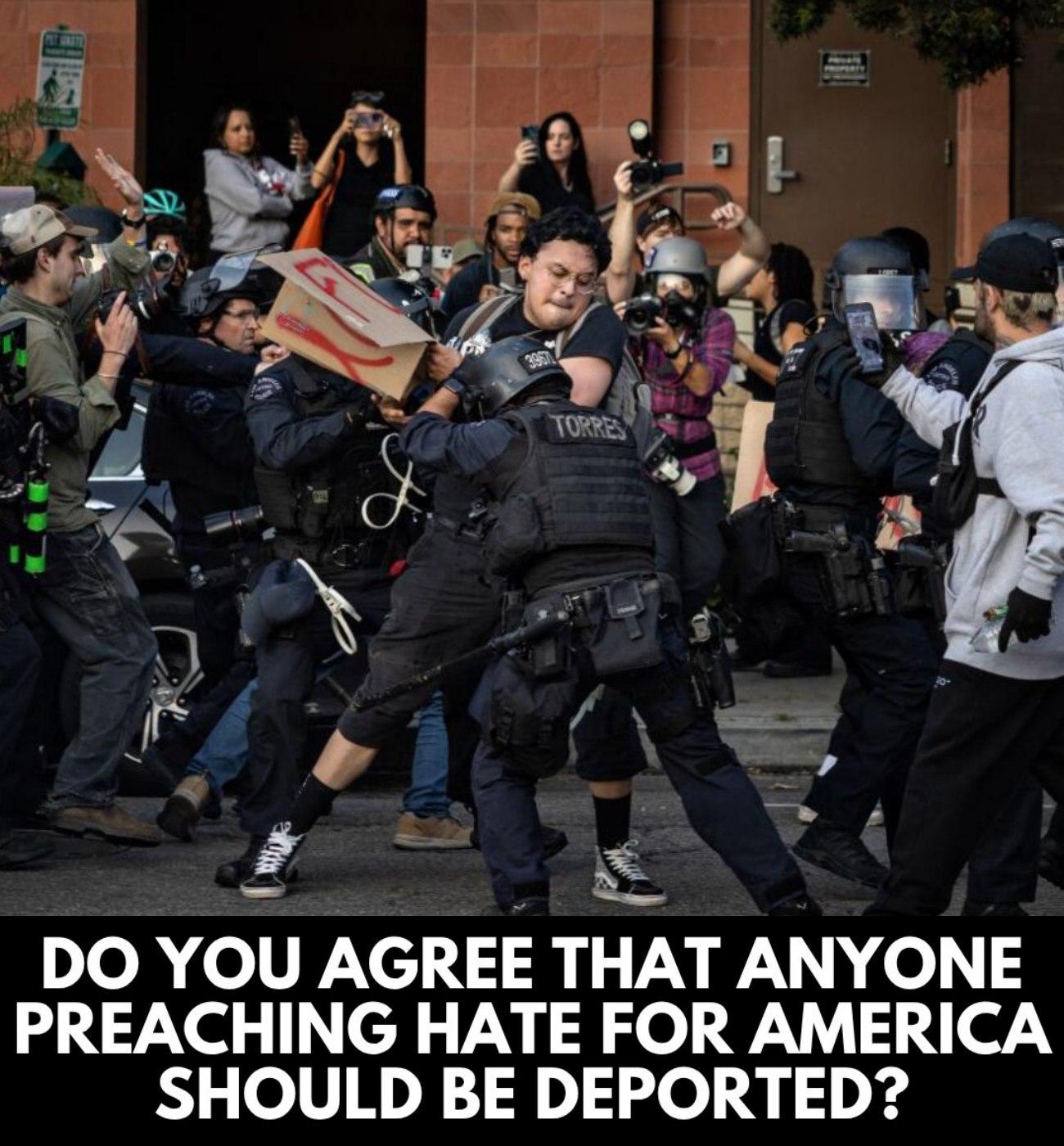
In a time when political polarization is at an all-time high and civil unrest continues to erupt across cities in the United States, a powerful image has resurfaced and ignited a firestorm of debate. The photo shows a chaotic street scene with riot police clashing with protestors and journalists capturing every second. The bold caption plastered across the bottom asks a provocative question: “Do you agree that anyone preaching hate for America should be deported?”
This seemingly simple question has triggered a whirlwind of conversations that touch on constitutional freedoms, immigration policy, national identity, and the fine line between dissent and sedition. With emotions running high and public trust in government institutions fluctuating, this image has become a rallying point for both sides of the political spectrum.
Let’s unpack the controversy and understand what’s really at stake.
Free Speech or Threat to National Unity
The First Amendment of the U.S. Constitution guarantees every citizen the right to free speech—even when that speech is critical of the government or national policies. However, critics argue that when that speech crosses into the territory of inciting violence or promoting hatred against the nation itself, the line must be drawn.
Supporters of the “deport hate” stance claim that the United States has long welcomed immigrants from around the world under the condition that they respect American values, culture, and law. For them, openly calling for the downfall of the United States, burning the flag, or supporting extremist ideologies is not a form of protected dissent—it’s a direct threat to the country’s survival.
They argue that anyone who enters the U.S. and then actively undermines its foundational values should lose the privilege of remaining here. “Freedom doesn’t mean chaos,” one veteran tweeted. “If you hate this country so much, maybe you should leave it.”
The Counterargument Defending Dissent
On the other hand, many constitutional scholars and civil liberties advocates strongly oppose the idea of deporting individuals for their political views. They argue that the power to define what constitutes “hate for America” is dangerously subjective and could be abused by those in power to silence political opposition.
History offers many examples where patriotism was used as a tool to suppress marginalized voices fighting for justice. The Civil Rights Movement, anti-Vietnam War protests, and even the founding of the country itself included dissent that would be labeled “anti-American” by certain standards today.
“This country was built on protest,” one civil rights lawyer noted. “If we start deporting people for criticizing the government, we stop being a democracy and become something else entirely.”
Immigration Policy Meets Patriotism
The conversation takes on an even more complex tone when immigration is factored in. Deportation is, after all, a tool of immigration enforcement. But using it as a response to speech or protest raises serious legal and ethical concerns.
Should naturalized citizens be held to different standards than those born in the U.S.? Can voicing strong political opinions be treated as grounds for removal from the country? These questions force lawmakers and citizens alike to consider how far patriotism should go—and when it becomes authoritarianism.
The Social Media Echo Chamber
Part of what makes this image and its caption so controversial is the platform it’s circulating on. Social media has become a breeding ground for echo chambers where users are often only exposed to views that reinforce their existing beliefs.
On one side, thousands of comments praise the idea, calling it “common sense” and demanding a crackdown on perceived un-American behavior. On the other, critics accuse it of fascist undertones, warning that such rhetoric opens the door to censorship, racial profiling, and political persecution.
The caption doesn’t just ask a question—it demands a reaction.
What Does ‘Hate’ Really Mean
Perhaps the most difficult challenge is defining what qualifies as “preaching hate.” Is protesting against police brutality hate for America? Is criticizing foreign policy decisions or calling for climate action anti-American?
Those in favor of broad protections for dissent argue that labeling dissent as hate is a tactic used to discredit movements and stifle progress. Meanwhile, others contend that open hostility toward the nation, especially from those who benefit from its freedoms and protections, is unacceptable and should be met with consequences.
A Nation Divided or A Nation Defending Itself
At its core, this image represents a larger struggle in America today—a battle over identity, values, and the meaning of patriotism. For some, loving your country means defending it from all threats, even internal ones. For others, loving your country means holding it accountable and pushing it to live up to its ideals.
This debate is not new. But in today’s politically charged atmosphere, every word, every image, and every protest is amplified to national proportions. As midterms and presidential elections approach, expect to see more slogans, more rallies, and more images just like this one, pushing the boundaries of what it means to be American.
Final Thoughts
This is not just about one image or one caption. It’s about the soul of a nation and the values it chooses to protect. Whether you see the question as a call for justice or a threat to liberty, one thing is clear—America is in the midst of defining its future, and voices on all sides are fighting to be heard.
So where do you stand? Should anyone preaching hate for America be deported, or is that an attack on the freedoms this nation was built upon?




